
Lazarus Epae Ereng is currently the assistant chief for Nachukui sub location, Lowerengak in Turkana County. Since 2010, Lazarus has been an active member of Shalom-SCCRR community peace groups in the area-along the Kenya-Ethiopia borderline which is also an extension of Ilemi Triangle (a contested territory where Kenya, South Sudan and Ethiopia interface with each other. It is a bloody battlefield for ethnic communities living in and straddling the borders).

Prof. Wanakayi Omoka, Shalom-SCCRR’s director of research and Mr. Paulson Erot MA, the program manager for northern Kenya conducting research with the local community in Nyememeri village, Ethiopia
In his recent visit to Shalom-SCCRR offices in Nairobi, Chief Lazarus gave an extensive elaborate update of the conflict situation between Dassenach community in Sies (in south western of Ethiopia near the Kenyan-Ethiopia Border) and Turkana Community in Todonyang (located in the north-eastern corner of Turkana County along the Kenya Ethiopian Border). He began by thanking Shalom-SCCRR for the enormous impact the organization has had on his life and numerous ethnic communities. He said that the support of Shalom-SCCRR for his promotion to becoming a chief has been much appreciated by the people where he works. The professional trainings he had received from Shalom-SCCRR concerning analytical skills on the causes of conflict, and peacebuilding techniques, he said, “were major factors in his appointment to becoming a chief among his people”. He then went on to deliberate on the impact of Shalom-SCCRR’s peacebuilding interventions and educational/development projects in the Ilemi Triangle. Speaking to Shalom-SCCRR Executive director Rev. Fr. Oliver Noonan MA, and Mr Godfrey Okoth, MA, Director of Programs, he highlighted the importance,
“of Shalom-SCCRR’s ongoing commitment to work for peace in his community and the entire Ilemi Triangle, as it is a severely marginalized region, where the people suffer from lack of basic human necessities concerning issues of food, safe drinking water, human security, education and medical care,…the region is struggling with lack of proper institutions and poor infrastructure as well as border issues which need to be attended too”.
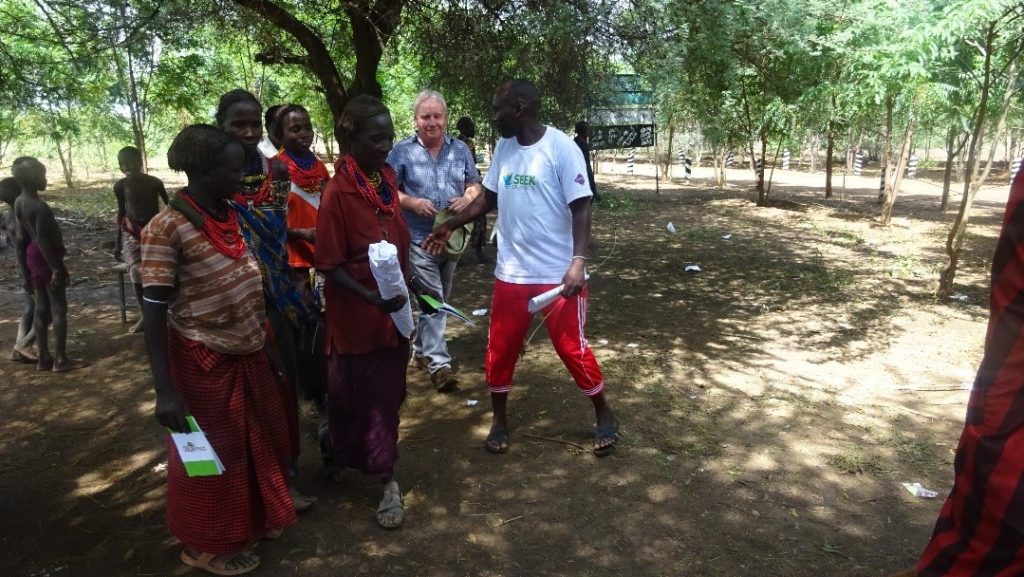
Concerning Shalom-SCCRR Covid-19 rapid response programs in marginalized and conflict environments, he said that he couldn’t express his gratefulness enough;
“Shalom-SCCRR’s consistent reach-out with all forms of communications enhanced awareness and prevention for the Turkana people and others from catching Covid-19. Further, the work of health workers and community facilitators whose trainings are funded by Shalom-SCCRR was extremely helpful in mitigating transmission of Covid-19 in our remote communities. Personal Protective Equipment (PPEs) and Medical supplies, provided by Shalom-SCCRR, are also a great input to our ill-equipped health centers.”
Chief Lazarus highlighted Shalom-SCCRR’s enormous contribution in development of inter-ethnic and inter-religious education in the region. Shalom-SCCRR has implemented more than 25 educational development projects in his region which includes; construction of standard classrooms, equipping them with lockers, chairs and desks; provision of solar lighting systems; construction of secure dormitories and equipping them with beds and mattresses, Construction of standard latrines as well as providing them with up to date text books to ensure that the pastoralist children in this marginalized area, access quality education.

Responding to Francis Mwangi (monitoring and evaluation coordinator in Shalom-SCCRR) on the impacts of the Shalom-SCCRR projects, he noted that;
“There has been a high rate of enrollment and retention of school-going children. I would like to specifically highlight the increase of enrolment and retention of girls in schools. This is to a large extent due to Shalom-SCCRR’s development support to schools in the region.”

Chief Lazarus commended Shalom-SCCRR’s methodology and approach to conflict transformation and peacebuilding as distinctively appropriate and highly appreciated by the local communities in the region. He appreciated the importance of empowering people from the grassroots up.
“We thank Shalom-SCCRR for its commitment in empowering our communities with the capacities for conflict prevention, management and resolution in the past 12 years. The local-based structures that have been established and strengthened through Shalom-SCCRR’s work are now operational, and are helping a huge amount in the prevention and management of conflicts between the Turkana and Dassenach communities along the Kenya – Ethiopia borderline.”
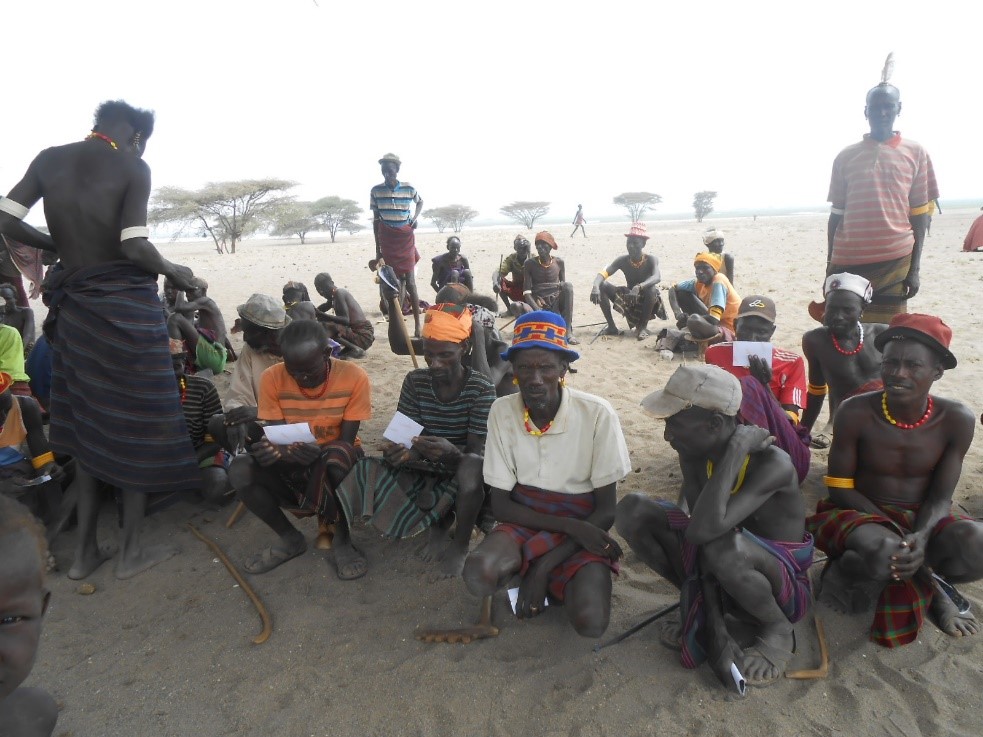
While engaged by Paulson Erot, MA. (Program Manager Shalom-SCCRR Northern Kenya Program), on the impact of peacebuilding trainings by Shalom-SCCRR, he stated that;
“Community members have been transformed through conflict transformation and peace building trainings and have been trained to transmit peace building and development techniques to the other members of the community, a lot of people are alive today because of this help and we now believe lasting peace can be achieved, and as you know achieving peace and reconciliation takes a lot of effort”.
“Shalom-SCCRR trained community members are considered very competent and are given opportunities in Chiefs barazas (meetings) to advocate for peace. Importantly, these members are also actively involved in resolving disputes in the villages and are called upon by other peace agents to attend and contribute to their peace meetings.”
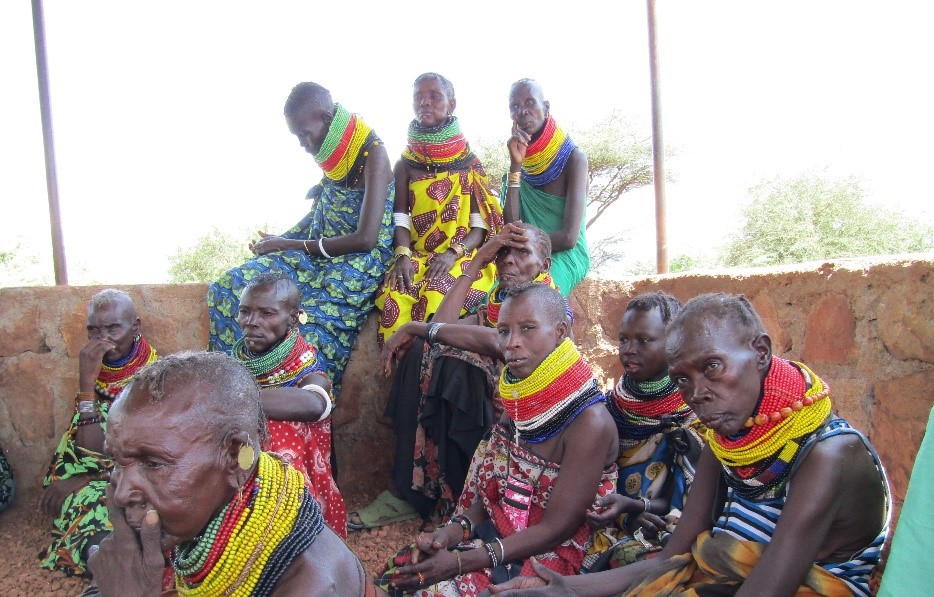
On women empowerment and involvement in peacebuilding process, Chief Lazarus explained to Mrs. Joyce Wamae MA. (Program Manager Shalom SCCRR Program), that:
“Women are much more involved in peacebuilding in the area than they were 10 years ago. The percentage has immensely increased. Women trained by Shalom-SCCRR are more and more key activists and are tasked to champion peace activities with their fellow women in women groups throughout their own ethnic community and interact with other tribes,. …they also challenge the men to work harder for peace”.

Chief Lazarus was very appreciative of Shalom SCCRR work and support accorded to him and his community. He vividly recounted the incident where Shalom-SCCRR’s International Chairman Rev Dr. Patrick Devine saved his life and that of other Turkanas while accompanying him on a research expedition in a Dassanech populated area near the Kenya-Ethiopia border. (https://shalomconflictcenter.org/wp-content/uploads/2021/02/SHALOM-SCCRR-INTERNATIONAL-CHAIRMAN-INTERVENED-TO-SAVE-THE-LIVES-OF-LAZARUS-EPAE-AND-PAUL-AGIS-IN-THE-ILEMI-TRIANGLE-REGION.-1.pdf)
He said, “this experience is forever engraved on his and his companions hearts”. The Turkana attack, referred to above, on the Dassenach village was in retaliation for an attack by the Dassenach on a Turkana settlement four days earlier.
Shalom-SCCRR is in the process of providing more inter community conflict transformation and peacebuilding forums between the Turkana and Dassenach Communities. This is aimed at further stabilizing relationship between these two communities on the path to reconciliation epitomized by peace, truth, justice and mercy.

He requested Shalom-SCCRR to continue staying in solidarity with the people of the community living in the Ilemi Triangle and empower them to be the architect of their own interdependent future. He praised the Shalom-SCCRR Communication Department for all their newsletters and correspondence to the people in this remote area.
Shalom-SCCRR were delighted with Assistant Chief Lazaraus visit and encouraged him in his role and assured all parties in the conflict zones of Shalom-SCCRR’s continuous commitment to help bring about sustainable peace.
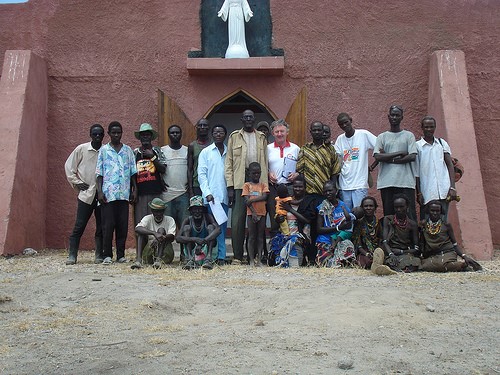
References;
Devine. P. (2009). “Turkana-Dassanech Conflict: Causes and Consequences.” Hekima University College (Catholic University of Eastern Africa). http://hipsir.hekima.ac.ke/images/stories/downloads/Newsletters/Peace-Dialogue-Issue-19.pdf
Mwangi, F. (2019). (The Ilemi Triangle’; Shalom-SCCRR’s conflict pre-assessments with cross-border communities) Shalom Center for Conflict Resolution and Reconciliation. https://shalomconflictcenter.org/the-ilemi-triangle-shalom-sccrrs-conflict-pre-assessments-with-cross-border-communities/
Ngacha, A. M., (2020). Diminishing role of traditional mechanisms in the management of pastoralist conflict: An Analysis of Turkana-Dassanech conflict. Available at: https://shalomconflictcenter.org/briefing-paper-no-2-an-analysis-of-turkana-dassenach-conflict/
Tadeo, P. E. (2021). Climate change, Lake Turkana and inter-communal conflicts in the Ilemi triangle region. https://shalomconflictcenter.org/briefing-paper-no-11/
By;
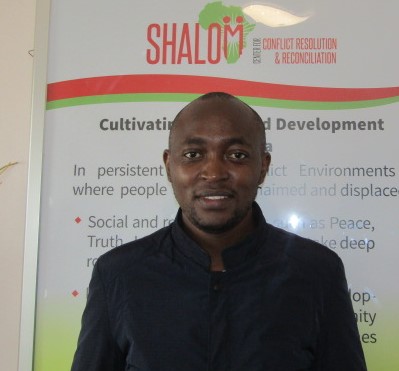
Austin Ngacha Macharia MA.
Project Officer, Ilemi Triangle,
Shalom Center for Conflict Resolution and Reconciliation (SCCRR)
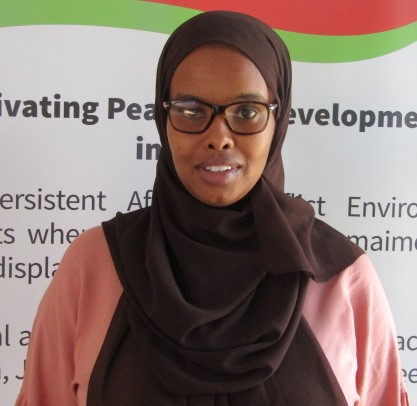
Asha Said Awed, MA.
Program Assistant (Nairobi, Marsabit & Turkana-West Pokot Projects)
Shalom Center for Conflict Resolution and Reconciliation (SCCRR)

